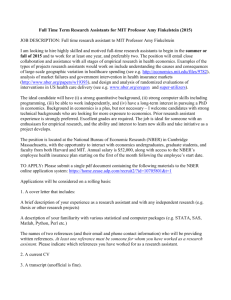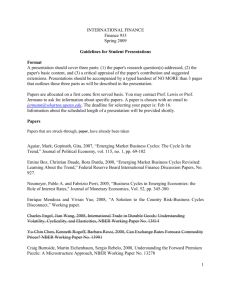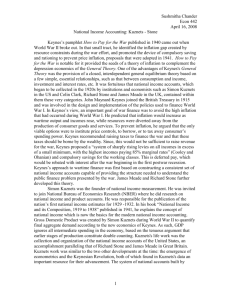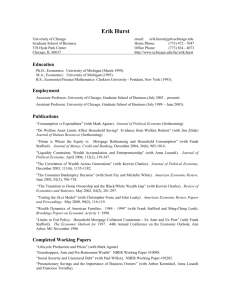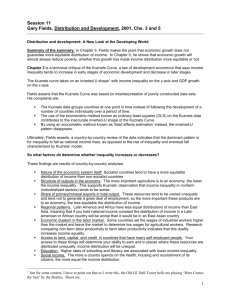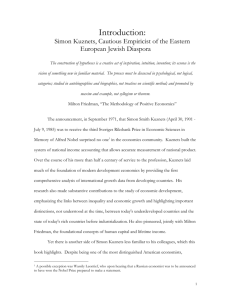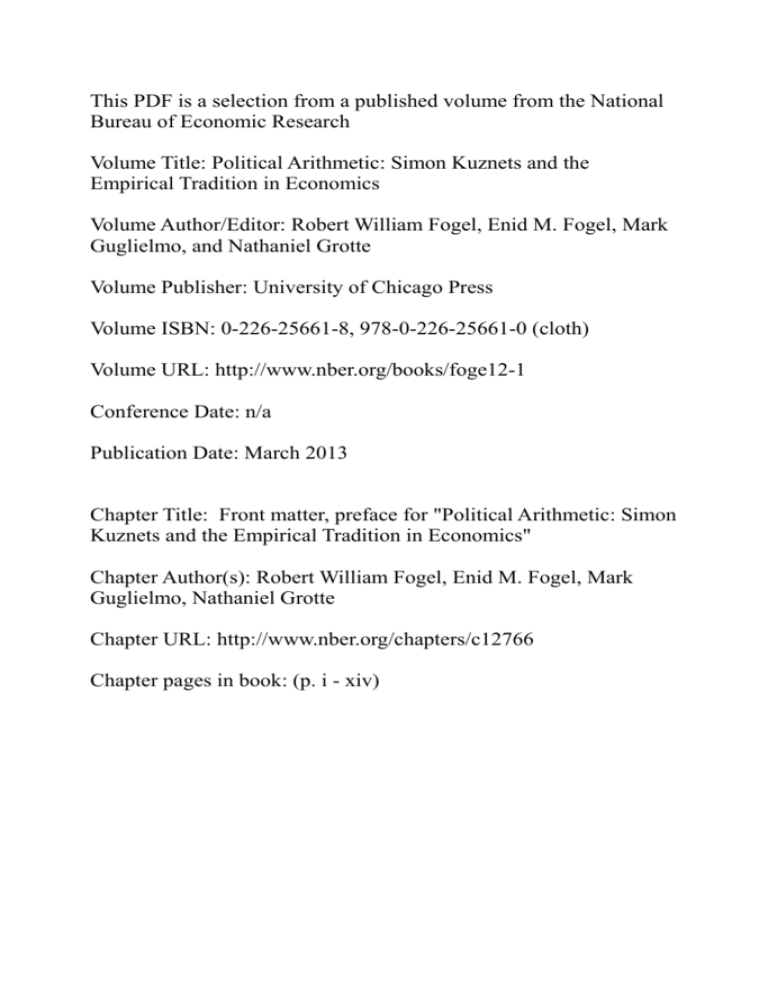
This PDF is a selection from a published volume from the National
Bureau of Economic Research
Volume Title: Political Arithmetic: Simon Kuznets and the
Empirical Tradition in Economics
Volume Author/Editor: Robert William Fogel, Enid M. Fogel, Mark
Guglielmo, and Nathaniel Grotte
Volume Publisher: University of Chicago Press
Volume ISBN: 0-226-25661-8, 978-0-226-25661-0 (cloth)
Volume URL: http://www.nber.org/books/foge12-1
Conference Date: n/a
Publication Date: March 2013
Chapter Title: Front matter, preface for "Political Arithmetic: Simon
Kuznets and the Empirical Tradition in Economics"
Chapter Author(s): Robert William Fogel, Enid M. Fogel, Mark
Guglielmo, Nathaniel Grotte
Chapter URL: http://www.nber.org/chapters/c12766
Chapter pages in book: (p. i - xiv)
political aithmetic
NBER Series on Long-Term Factors in Economic Development
A National Bureau of Economic Research Series
Edited by Claudia Goldin
also in the series
Claudia Goldin
Understanding the Gender Gap: An Economic
History of American Women (Oxford University
Press, 1990)
Roderick Floud, Kenneth Wachter, and
Annabel Gregory
Height, Health and History: Nutritional Status
in the United Kingdom, 1750–1980 (Cambridge
University Press, 1990)
Robert A. Margo
Race and Schooling in the South, 1880–1950: An
Economic History (University of Chicago Press,
1990)
Samuel H. Preston and Michael R. Haines
Fatal Years: Child Mortality in Late NineteenthCentury America (Princeton University Press,
1991)
Barry Eichengreen
Golden Fetters: The Gold Standard and the
Great Depression, 1919–1939 (Oxford University
Press, 1992)
Ronald N. Johnson and Gary D. Libecap
The Federal Civil Service System and the Problem of Bureaucracy: The Economics and Politics
of Institutional Change (University of Chicago
Press, 1994)
Joseph P. Ferrie
Yankeys Now: Immigrants in the Antebellum
U.S., 1840–1860 (Oxford University Press,
1999)
Robert A. Margo
Wages and Labor Markets in the United States,
1820–1860 (University of Chicago Press, 2000)
Price V. Fishback and Shawn Everett Kantor
A Prelude to the Welfare State: The Origins of
Workers’ Compensation (University of Chicago
Press, 2000)
Gerardo della Paolera and Alan M. Taylor
Straining at the Anchor: The Argentine Currency
Board and the Search for Macroeconomic Stability, 1880–1935 (University of Chicago Press,
2001)
Werner Troesken
Water, Race, and Disease (MIT Press, 2004)
B. Zorina Khan
The Democratization of Invention: Patents and
Copyrights in American Economic Development,
1790–1920 (Cambridge University Press, 2005)
Dora L. Costa and Matthew E. Kahn
Heroes and Cowards: The Social Face of War
(Princeton University Press, 2008)
Naomi R. Lamoreaux
Insider Lending: Banks, Personal Connections,
and Economic Development in Industrial New
England (Cambridge University Press, 1994)
Roderick Floud, Robert W. Fogel, Bernard
Harris, and Sok Chul Hong
The Changing Body: Health, Nutrition, and
Human Development in the Western World since
1700 (Cambridge University Press, 2011)
Lance E. Davis, Robert E. Gallman, and Karin
Gleiter
In Pursuit of Leviathan: Technology, Institutions,
Productivity, and Profits in American Whaling,
1816–1906 (University of Chicago Press, 1997)
Stanley L. Engerman and Kenneth L. Sokoloff
Economic Development in the Americas since
1500: Endowments and Institutions (Cambridge
University Press, 2012)
Dora L. Costa
The Evolution of Retirement: An American Economic History, 1880–1990 (University of Chicago
Press, 1998)
Robert William Fogel, Enid M. Fogel, Mark
Guglielmo, and Nathaniel Grotte
Political Arithmetic: Simon Kuznets and the Empirical Tradition in Economics (University of Chicago Press, 2013)
National Bureau of Economic Research
officers
Kathleen B. Cooper, Chairman
Martin B. Zimmerman, Vice Chairman
James M. Poterba, President and Chief Executive Officer
Robert Mednick, Treasurer
directors at large
Peter C. Aldrich
Elizabeth E. Bailey
John H. Biggs
John S. Clarkeson
Don R. Conlan
Kathleen B. Cooper
Charles H. Dallara
George C. Eads
Jessica P. Einhorn
Kelly Horak, Controller and Assistant Corporate
Secretary
Alterra Milone, Corporate Secretary
Gerardine Johnson, Assistant Corporate
Secretary
Mohamed El-Erian
Linda Ewing
Jacob A. Frenkel
Judith M. Gueron
Robert S. Hamada
Peter Blair Henry
Karen N. Horn
John Lipsky
Laurence H. Meyer
directors by university app ointment
George Akerlof, California, Berkeley
Jagdish Bhagwati, Columbia
Timothy Bresnahan, Stanford
Alan V. Deardorff, Michigan
Ray C. Fair, Yale
Franklin Fisher, Massachusetts Institute of
Technology
Edward Foster, Minnesota
Michael H. Moskow
Alicia H. Munnell
Robert T. Parry
James M. Poterba
John S. Reed
Marina v. N. Whitman
Martin B. Zimmerman
John P. Gould, Chicago
Mark Grinblatt, California, Los Angeles
Bruce Hansen, Wisconsin–Madison
Marjorie B. McElroy, Duke
Joel Mokyr, Northwestern
Andrew Postlewaite, Pennsylvania
Uwe E. Reinhardt, Princeton
David B. Yoffie, Harvard
directors by app ointment of other organizations
William W. Lewis, Committee for Economic
Bart van Ark, The Conference Board
Development
Christopher Carroll, American Statistical
Robert Mednick, American Institute of Certified
Association
Public Accountants
Jean-Paul Chavas, Agricultural and Applied
Alan L. Olmstead, Economic History Association
Economics Association
Peter L. Rousseau, American Economic
Martin Gruber, American Finance Association
Association
Ellen L. Hughes-Cromwick, National Association
Gregor W. Smith, Canadian Economics
for Business Economics
Association
Thea Lee, American Federation of Labor and
Congress of Industrial Organizations
directors emeriti
Glen G. Cain
Carl F. Christ
George Hatsopoulos
Saul H. Hymans
Lawrence R. Klein
Rudolph A. Oswald
Peter G. Peterson
Nathan Rosenberg
John J. Siegfried
Craig Swan
Relation of the Directors to the Work and Publications
of the National Bureau of Economic Research
1. The object of the NBER is to ascertain and present to the economics profession, and to the public
more generally, important economic facts and their interpretation in a scientific manner without policy
recommendations. The Board of Directors is charged with the responsibility of ensuring that the work
of the NBER is carried on in strict conformity with this object.
2. The President shall establish an internal review process to ensure that book manuscripts proposed
for publication DO NOT contain policy recommendations. This shall apply both to the proceedings of
conferences and to manuscripts by a single author or by one or more co-authors but shall not apply to
authors of comments at NBER conferences who are not NBER affiliates.
3. No book manuscript reporting research shall be published by the NBER until the President has sent
to each member of the Board a notice that a manuscript is recommended for publication and that in the
President’s opinion it is suitable for publication in accordance with the above principles of the NBER.
Such notification will include a table of contents and an abstract or summary of the manuscript’s content, a list of contributors if applicable, and a response form for use by Directors who desire a copy of
the manuscript for review. Each manuscript shall contain a summary drawing attention to the nature
and treatment of the problem studied and the main conclusions reached.
4. No volume shall be published until forty-five days have elapsed from the above notification of intention to publish it. During this period a copy shall be sent to any Director requesting it, and if any Director objects to publication on the grounds that the manuscript contains policy recommendations, the
objection will be presented to the author(s) or editor(s). In case of dispute, all members of the Board
shall be notified, and the President shall appoint an ad hoc committee of the Board to decide the matter; thirty days additional shall be granted for this purpose.
5. The President shall present annually to the Board a report describing the internal manuscript review
process, any objections made by Directors before publication or by anyone after publication, any disputes about such matters, and how they were handled.
6. Publications of the NBER issued for informational purposes concerning the work of the Bureau, or
issued to inform the public of the activities at the Bureau, including but not limited to the NBER Digest
and Reporter, shall be consistent with the object stated in paragraph 1. They shall contain a specific disclaimer noting that they have not passed through the review procedures required in this resolution. The
Executive Committee of the Board is charged with the review of all such publications from time to time.
7. NBER working papers and manuscripts distributed on the Bureau’s web site are not deemed to be
publications for the purpose of this resolution, but they shall be consistent with the object stated
in paragraph 1. Working papers shall contain a specific disclaimer noting that they have not passed
through the review procedures required in this resolution. The NBER’s web site shall contain a similar
disclaimer. The President shall establish an internal review process to ensure that the working papers
and the web site do not contain policy recommendations, and shall report annually to the Board on
this process and any concerns raised in connection with it.
8. Unless otherwise determined by the Board or exempted by the terms of paragraphs 6 and 7, a copy
of this resolution shall be printed in each NBER publication as described in paragraph 2 above.
political
aithmetic
Simon Kuznets and the Empirical Tradition in Economics
R o b e rt W i l l i a m F o g e l , E n i d M . F o g e l ,
M a r k G u g l i e l m o, a n d N at h a n i e l G r o t t e
The University of Chicago Press$chicago and london
Winner of the 1993 Nobel Prize for Economics, Robert William
Fogel is the Charles R. Walgreen Distinguished Service Professor
of American Institutions at the Booth School of Business, director of the Center for Population Economics, and a member of
the Department of Economics and of the Committee on Social
Thought at the University of Chicago. He is also a research associate of the National Bureau of Economic Research. Enid M.
Fogel was associate dean of students at the Booth School of
Business. Mark Guglielmo is assistant professor of economics at
Bentley University. Nathaniel Grotte is associate director of the
Center for Population Economics.
The University of Chicago Press, Chicago 60637
The University of Chicago Press, Ltd., London
© 2013 by The University of Chicago
All rights reserved. Published 2013.
Printed in the United States of America
22 21 20 19 18 17 16 15 14 13$$1 2 3 4 5
ISBN-13: 978-0-226-25661-0 (cloth)
ISBN-13: 978-0-226-02072-3 (e-book)
Library of Congress Cataloging-in-Publication Data
Fogel, Robert William.
$Political arithmetic : Simon Kuznets and the empirical tradition in economics / Robert William Fogel, Enid M. Fogel, Mark
Guglielmo, and Nathaniel Grotte.
$$$pages ; cm. — (NBER series on long-term factors in economic development)
$Includes bibliographical references and index.
$ISBN 978-0-226-25661-0 (cloth : alkaline paper) — ISBN 9780-226-02072-3 (e-book) 1. Kuznets, Simon, 1901–1985—Influence. 2. Economics—Research—United States. 3. National income—United States—Accounting—History—20th century.
4. National Bureau of Economic Research. I. Fogel, Enid M.
II. Guglielmo, Mark. III. Grotte, Nathaniel. IV. Title. V. Series:
NBER series on long-term factors in economic development.
$HC110.I5F64 2013
$339.3'2—dc23
2012031749
o This paper meets the requirements of ANSI/NISO Z39.48-1992
(Permanence of Paper).
Contents
Prefac e xi
Introduction: The Amazing Twentieth Century 1
1 The Rise of Academic Economists before World War I 10
2 The Early History of the NBER 21
3 The Emergence of National Income Accounting as a Tool of
Economic Policy 49
4 The Use of National Income Accounting to Study Comparative
Economic Growth 65
5 The Scientific Methods of Simon Kuznets 89
6 Further Aspects of the Legacy of Simon Kuznets 106
7 The Quarter Century since the Death of Simon Kuznets 115
Acknowled gments 119
Referen c es 121
Index 135
To Penelope Enid Anderegg and Maximillian Thor Pietraszewski,
great-grandchildren of Enid and Bob
Preface
This book is about the scientific work of Simon Kuznets and his impact on economics as a discipline. Kuznets was the winner of the third
Nobel Prize in economics, which he received in 1971 for his work on
comparative economic growth. He was also an exceptionally inspiring teacher who influenced the research and teaching of some of the
best economists in economics and demography.
The book begins with a view of the great accomplishments of the
twentieth century. Chapter 1 offers a history of the development of
economics as an academic discipline prior to World War I. Chapter
2 describes the establishment of the NBER as an objective collector
and analyzer of economic data that would be useful to policymakers.
Chapter 3 describes the development of national income accounting
at the NBER as a major tool for analyzing and assessing the performance of the economy and for guiding government interventions. It
also describes the leading role played by Kuznets in demonstrating
the power of this tool as a successful guide to the allocation of available resources between military needs and the civilian economy during World War II. Chapter 4 deals with Kuznets’s use of national income accounting to analyze the factors accounting for the differences
in the rate of growth among nations, the specific work for which he
was awarded the Nobel Prize. Chapter 5 reviews Kuznets’s scientific
methods. Chapter 6 examines the continuing impact of Kuznets’s research and his influence on economics. Chapter 7 considers the global
economy in the quarter century after Kuznets’s death with forecasts of
the nature and future of both the domestic and the global economies.
xii
P r e fa c e
Kuznets is introduced early in the introduction, then recedes into
the background until chapter 3. To lighten that drought, we address
now a question often put to us: What was Kuznets like as a person?
To Robert Fogel, he was a beloved teacher who took a fatherly interest
in both the intellectual and the personal aspects of his students’ lives.
That interest did not end after those students completed their graduate work and were off teaching somewhere on their own. Kuznets encouraged them to keep in touch and come visit him at home whenever they were in town.
“And so we did,” said Fogel. Enid and Bob, with children in tow, often visited Simon either at his office or his home. After bouncing each
of the boys on his knee and talking with them for a bit, he would settle
back in his chair and ask, “So, Mr. Fogel, what have you been working
on lately?” He listened to the answer carefully, sometimes probing for
more detail, occasionally offering suggestions.
Kuznets had many students, all of whom wanted his help after they
were launched on their own careers. When Fogel asked Simon to give
a paper at his workshop in Chicago, Simon said, “You don’t need me.”
But, when a less successful student issued the same invitation, Kuznets
accepted without hesitation.
One day shortly after Simon’s death, Fogel was at Kuznets’s home,
helping organize his papers for deposit at the Harvard Library. “Simon,” his widow, Edith, said, “was modestly immodest.” By that, she
meant he was immodest in his desire to identify and measure the driving forces of economic growth but modest about his capacity to do
so. He was always more focused on what he still had to learn than on
what he already knew.
Born in Pinsk, Russia, on April 30, 1901, Kuznets received his education in primary school and gymnasium in Kharkov. He served
briefly as a section head in the bureau of labor statistics of the Ukraine
before emigrating to the United States in 1922. He entered Columbia
University, where he received his B.A. in 1923, his M.A. in 1924, and
his Ph.D. in 1926. His principal teacher at Columbia, and his lifelong
mentor, was Wesley Clair Mitchell, a founder of the NBER and its director of research from 1920 to 1946.
Kuznets was a member of the research staff of the NBER from 1927
to 1961. It is there that he met Edith Handler. They were married in
P r e fa c e
xiii
1929 and had two children, Paul and Judith. Kuznets also held professional appointments in economics and statistics at the University of
Pennsylvania (1930–54) and in economics at Johns Hopkins University (1954–60) and Harvard University (1960–71). During 1932–34,
he served in the Department of Commerce, where he constructed
the first official estimates of U.S. national income and laid the basis
for the National Income Section. During World War II, he served as
the associate director of the Bureau of Planning and Statistics of the
War Production Board. He was instrumental in establishing the Conference on Research in Income and Wealth (which brought together
government officials and academic economists engaged in the development of the U.S. national income and product accounts) in 1936
and helped establish its international counterpart, the International
Association for Research in Income and Wealth, in 1947. He served
as an adviser to the governments of China, Japan, India, Korea, Taiwan, and Israel in the establishment of their national systems of economic information.
Despite his extensive activities in the design of government programs of economic intelligence and his work in consulting with such
private agencies as the Growth Center of Yale University and the Social
Science Research Council, Kuznets was a prolific analyst of economic
processes and institutions. During the course of his career, he produced thirty-one books and over two hundred papers, many of which
set off major new streams of research. Among the fields in which he
pioneered, in addition to national income accounting, were the study
of seasonal, cyclic, and secular fluctuations in economic activity; the
impact of population change on economic activity; the study of the
nature and causes of modem economic growth based on the measurement of national aggregate statistics; the household distribution
of income and its trends in the United States and other countries; the
measurement and analysis of the role of capital in economic growth;
the impact of ideology and other institutional factors on economic
growth; changing patterns in consumption and in the use of time; and
methods of economic and statistical analysis. Kuznets’s intellectual
contributions were acknowledged by his colleagues in many ways, including his election as president of the American Statistical Association in 1949 and of the American Economic Association in 1954.

